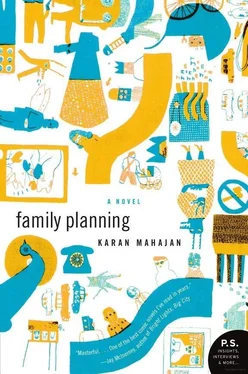One morning, at the bus stop, Arjun finally told Varun what he’d seen.
“So what? He’s a servant,” Varun said.
“Yaar, listen to yourself speak before you utter words,” Arjun reprimanded him. “You want me to tell Papa? Or worse, I can tell Shankar, and he’ll enthusiastically fill your school water-bottle every night with liters of his spit. Or cut his nails in your mango milkshake. Just stop hitting the cricket ball blindly around the house, okay? Restrict yourself to straight drives for a week, see how it feels.”
“With all due respect, Mr. Judge, Judge Bhaiya , if you will, maybe you are saying all this because you’re, ahem, bad at cricket? What about all the times you made Shankar play badminton with you when he hates doing it?”
“Okay, Varun, that’s it. I’m asking you not to be cruel to a person who has less money than you do, that’s all, but now you leave me with no choice.”
“No—” cowered Varun.
“Yes. From now on—” said Arjun.
“No, you know I—” Varun begged.
But Arjun was adamant. “From now on, you’re going to have to play cricket with a tennis ball instead.”
A tennis ball was for sissies. Thus, Varun had been emasculated. But even that was better than having Papa tell him he couldn’t play cricket at all. That’s how afraid he was of Papa (Papa, who rarely got angry but, when he did, could brainwash the entire household against you), even he, Varun, a man’s man who popped the collar of his Modern School shirt to hide the giant yo-yo of his Adam’s apple.
Now, Arjun knew, Varun would no doubt ask for a revocation of his softball sentence. He would claim he missed the sound of willow on cork, the fantastic wooden vibration of the bat passing through your whole body, stopping your heart for an instant.
Which he did: Arjun relented.
The same was true for the other children, with the exception of Rishi. Rishi’s response to the generally bad-tempered tactics of his siblings had been to strike back with apology. He had been so thoroughly bullied by Varun, Rahul, Tanya, Rita and, yes, even the supposedly benign Arjun, that he sought refuge in the cool English lilt of the word sorry .
A typical Rishi sentence went something like this: “Sor-ry. Sorry. Sorry. Swaaareee. Swaaaaari.”
And then, when you thought it was over, he would deploy his masterstroke, the sorry flurry: “I’m sorry sorry sorry sorry sorry sorry sorry sorry sorry sorry sorry sorry sorry sorry sorry sorry sorry sorry sorry sorry sorry sorry sorry sorry sorry sorry sorry sorry sorry sorry sorry sorry sorry sorry sorry sorry sorry sorry sorry sorry sorry sorry sorry sorry.”
“Okay, okay, fine, shut up, shut up!”
“Sorry sorry sorry sorry sorry sorry sorry sorry sorry sorry sorry sorry sorry sorry sorry sorry sorry sorry sorry sorry sorry sorry sorry sorry sorry sorry sorry sorry sorry sorry sorry sorry sorry sorry sorry sorry sorry sorry sorry sorry sorry sorry sorry sorry sorry sorry sorry sorry sorry sorry sorry sorry sorry sorry sorry sorry sorry sorry sorry sorry sorry sorry sorry sorry sorry sorry sorry sorry sorry sorry sorry sorry sorry sorry sorry sorry sorry sorry sorry sorry sorry sorry sorry sorry sorry sorry sorry sorry sorry.”
“It’s time for dinner you bloody fool!”
They would head to the table. “Sorry sorry sorry but I’m really sorry, bhaiya, so sorry please pass me a chappati sorry sorry sorry sorry sorry—”
“What are you doing, son?” Rakesh would ask.
“Sorry Papa sorry sorry sorry sorry sorry sorry sorry…”
“Eh? What’s he saying, Arjun?”
“Papa he’s saying sorry sorry sorry sorry sorry sorry—”
“THAT’S THE SAME THING AS WHAT HE’S SAYING. SAY AGAIN?”
“I thought that’s what you wanted to know — what he was saying?”
“Why isn’t he bloody stopping! Son! Eh?”
“Papa, once again, let me repeat, RISHI AHUJA, YOUR SON, is saying: SORRY SORRY SORRY SORRY SORRY SORRY SORRY SORRY SORRY.”
“Arjun, I’m sorry Papa’s making you say what I’m saying. No, listen, I’m really sorry sorry sorry sorry….”
With Rishi, it was call and response, you had to calibrate your tone so you didn’t seem accusatory because if you did, heaven help your ears.
The rules of conversation in the house left little room for Arjun to beat about the bush. This Arjun knew: If you wanted to get a point across, you had to do it emphatically. There was little point in hiding your pain or expecting anyone to sense the subtleties of your personal torture. If you stared at your feet and circumlocuted, then another train of conversation would likely run right over you, flattening your putty resolve. You had to act fast and act quick and pretend, at all times, that the person you were talking to was (a) a person from the Agra Mad House, and (b) had been there for at least ten years, thus surviving electroshock therapy.
With Tanya — his sister who used her dark features to style herself into an emotional thunderbolt — Arjun expected sparks. “Why don’t you ask Rita?” she would likely say. “She has so many friends.” And, sadly, it was true. Rita and Tanya had nearly the same face — a pert button of a mouth set off against equine nostrils and baggy cheeks — yet Rita was fair and therefore pretty by default. Tanya reacted to this unfair favoritism by spending most of her time trapped in a dangerous circuit of personal toilette — applying makeup to cover her pimples even though the makeup only aggravated her pimples and caused her to apply more.
What she really needed , seven-year-old Sahil had one day made the mistake of earnestly saying, what she really needed was Fair and Lovely Cream .
It was a rather large mistake. The family had felt that day not like a war zone but rather a bunker shaking under a war zone, everyone huddled together in a dense nest of limbs while the calamity happened overhead. A calamity called the perpetual wailing of Tanya.
Thus primed in the passions of Tanya, Arjun proceeded with caution.
“In a band, haan?” Tanya said, chewing gum. “What’s it called? I Failed Class Eleven? ”
Tanya was just discovering sarcasm, so Arjun let it pass. “It’s called Radiohead,” he said. Arjun didn’t bother explaining that such a band already existed.
“Radiohead?” squealed Tanya.
“Radiohead!”
“Rahul,” said Tanya, “Bhaiya’s band is called Radiohead!”
“Bhaiya,” said Rahul, dropping the GI Joes he was playing with. “Does this mean you’ll wear a turban. Like a sardar.”
Arjun glared at him.
But Rahul was full of questions. “Bhaiya, does your band have eighteen people?”
“Eighteen? Why?”
“Because you thought that under eighteen was not allowed for a rock show!”
“Good one, yaar,” said Tanya, crushing slightly on Rahul’s effeminate charms.
“I don’t get it,” Arjun said, even though he did.
“I do get it!” said Tanya, even though she didn’t.
“Explain it to me, Tanya,” said Arjun.
“Explain it to him,” repeated Rahul.
“Why don’t you explain it? It was your joke?” Tanya whimpered.
“So?” asked Rahul. “Bhaiya asked you first. Plus, I’m older and older wins. Right, bhaiya?”
This was typical, thought Arjun. Everyone was out to screw everyone else.
“Enough jokes! Now listen.”
“Don’t shout, Bhaiya,” said Tanya, feeling ganged-up on, as she often did.
“Well, I want to ask you — and even you, Rahul — for your help. I want to have a concert for my band on next Sunday. I was wondering if you could bring a few friends to the house that day and ask them to watch my band play without laughing or criticizing?”
Читать дальше












